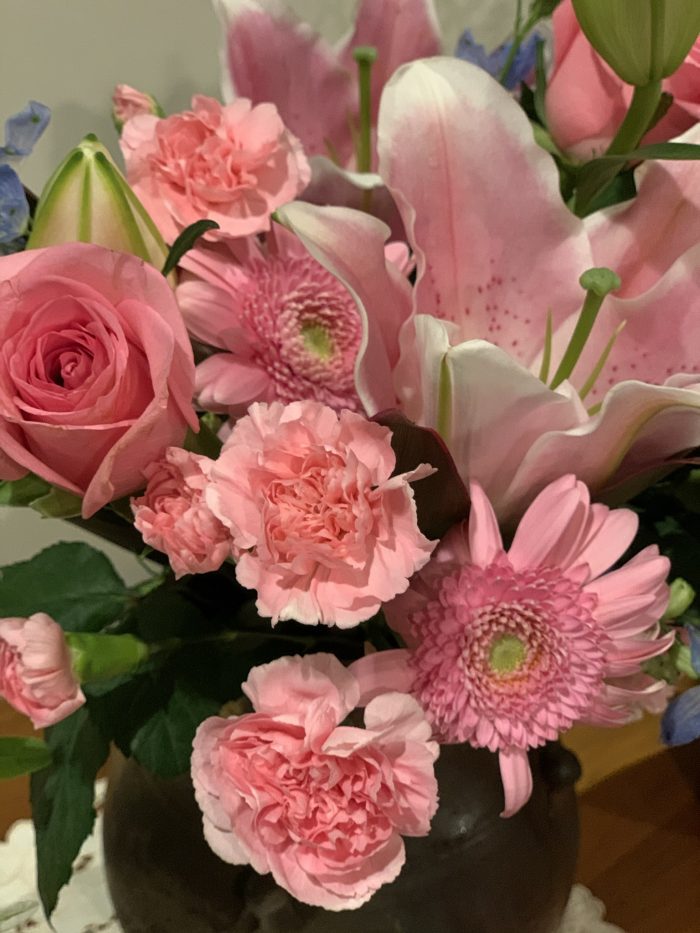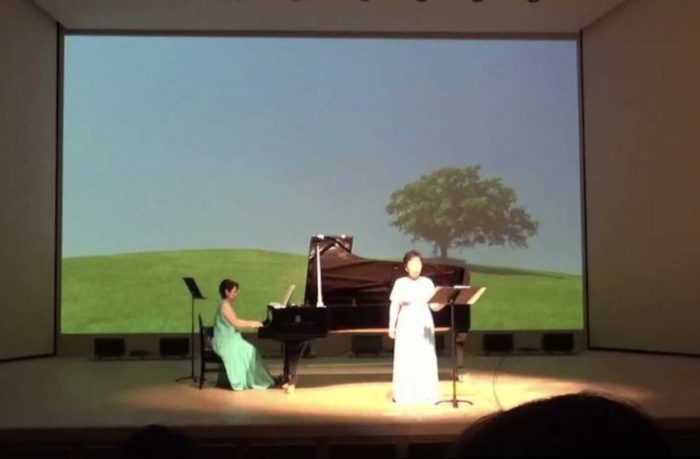木村邸跡地 Now (Dec. ’20~)
西公園の整備も進み、茅葺の屋敷が移設される準備が進んでいる。M氏邸跡の更地も3か月ほど前には市に所有者が移転したようで整備が進んでいる。
2021年春
2021/8/16
西公園の整備も進み、茅葺の屋敷が移設される準備が進んでいる。M氏邸跡の更地も3か月ほど前には市に所有者が移転したようで整備が進んでいる。
2021年春
2021/8/16
次回は3/27、4/3,、5/9のどれか。印象派作曲家を取り上げることになった(!)
| French | Les roses d’Ispahan | Chanson de printemps | Connais-tu Le Pays? |
| (German) | Im wunder–schönen Monat Mai | ||
| Japanese | バスの歌(大中恩) | 春のメドレー |

| French | Italian | |||
| Faure | Gouod | Tosti | Handel | Rossini |
| Après un rêve | Serenade du Passant | Aprile | Ch’io mai vi possa lasciar d’amare | Una voce poca fa |
| Les roses d’Ispahan | Chanson de printemps | |||
| Les Temps des Roses |
| German Lied | ||||
| Schubert | Schumann | Strauss | Dvorak | Mozart |
| Frühlings-glaube | Im Western | Zueignung | Mein Lied ertont | Sehnsucht nach dem Frühling |
| Winterreise 1. Gute Nacht | Lied der Suleika | Mit deinen blauen Augen | Rings ist der Wald so stumm und still | Das Veilchen |
| 5. Der Lindenbaum | Im wunder–schönen Monat Mai | Als die Alte Mutter | Vedrai, carino | |
| 6 (7) Wasserflut | Aus meinen Tränen sprießen | |||
| 11(21) Frühlings– traum | Die Rose, die Lilie, die Taube, die Sonne | |||
| 21(17) Das Wirtshaus | Ich grolle nicht | Schumann | ||
| 22(23) Mut | Und wüßten’s die Blumen, die kleinen | Du Ring an meinem Finger |

| English | Japanese |
| Scarborough Fair | 丹 澤 |
| Bridge over troubled water | 北秋の |
| The rose | かなしくなったときは (大中恩作曲) |
| Sometimes I Feel Like a Motherless Child | 初恋 |
| Summertime | |
| Deep River |
音楽にも「印象派」(”女性のひろば”より)3/10
これ!面白い。
琉球列島への3万年前の人類到達 偶然の漂着ではない 2020/12/4
約3万年前に琉球列島に住み着いた祖先たちは、黒潮に流されて偶然漂着したのではなく、意図して島へ航海した「開拓者」だった可能性が高い。そんな論文を東京大などのグループが3日、科学誌サイエンティフィック・リポーツに発表した。海洋調査用の漂流ブイの経路などを詳しく分析した結果、「漂流説」が強く否定されたという。
琉球の島々には3万年前ごろの旧石器時代の遺跡が点在し、人が台湾やフィリピン方面から海を渡ってきたと考えられている。人が移住するためには、10万年以上前からほぼ流路が変わっていない世界最速級の海流、黒潮を横切らなければならない。

グループは、海に流して位置や水温などを計測する漂流ブイに着目。米海洋大気局などに集まる世界各地のデータから、1989年から2017年に台湾東岸やルソン島北部から流された138個の経路などを調べた。
大多数は黒潮を横切れず、台湾の北方海上や中国大陸の方へ向かった。黒潮を横断した6個はいずれも台風や強い季節風の影響を受けていた。人が無事に航海するのは難しい気象条件と考えられた。また8個は九州やトカラ列島付近まで達したが、2~3週間かかるため人が舟の上で生き続ける可能性も小さいと思われた。
新しい島で人口を維持するには少なくとも男女計10人程度が必要という。漂流する舟に男女がうまく乗り合わせて島に到達する確率は極めて低いと結論づけた。
一方、ブイの中には台湾などへ再び漂着したものもあった。舟で漂流しながら生還した人が経験を基に航海の知識を身につけ、人々の中に蓄積されたとも考えられるという。
グループは昨年、国立科学博物館が主導した「3万年前の航海 徹底再現プロジェクト」で、5人乗りの丸木舟による台湾から与那国島への航海を成功させている。海部陽介・東京大総合研究博物館教授(前国立科学博物館人類史研究グループ長)は「漂流説がほとんどあり得ないことを、初めて説得力を持って示せた。海を渡った祖先は、意図的な移住に挑戦した開拓者というイメージが適切だろう」としている。
Palaeolithic voyage for invisible islands beyond the horizon
Abstract
How Palaeolithic maritime transportation originated and developed is one of the key questions to understand the world-wide dispersal of modern humans that began 70,000–50,000 years ago.
However, although the earliest evidence of maritime migration to Sahul (Australia and New Guinea) has been intensively studied, succeeding development of Paleolithic maritime activity is poorly understood. Here, we show evidence of deliberate crossing of challenging ocean that occurred 35,000–30,000 years ago in another region of the western Pacific, the Ryukyu Islands of southwestern Japan.
Our analysis of satellite-tracked buoys drifting in the actual ocean demonstrated that accidental drift does not explain maritime migration to this 1200 km-long chain of islands, where the local ocean flows have kept the same since the late Pleistocene.
Migration to the Ryukyus is difficult because it requires navigation across one of the world’s strongest current, the Kuroshio, toward an island that lay invisible beyond the horizon. This suggests that the Palaeolithic island colonization occurred in a wide area of the western Pacific was a result of human’s active and continued exploration, backed up by technological advancement.
Introduction
The rise of voyaging technology beyond nearshore boating was a key for early modern humans to exponentially expand their habitable territory on the globe.
Maritime migration to Sahul (a combined continent of Australia and New Guinea), which occurred about 47,000 years ago or earlier, is the oldest accepted evidence for open ocean crossings by modern humans1,2,3,4,5, and has been central to such discussion.
There is growing consensus that the colonization of Sahul was a consequence of deliberate voyages, based on theoretical considerations and circumstantial evidence such as the need of repeated sea-crossings, a more or less large number of immigrants needed to establish a viable population, and archaeologically demonstrated advanced maritime adaptation including pelagic fishing4,6,7,8,9 (but see ref.10 for a contrary view).
Although the exact seaway taken by these Palaeolithic voyagers still remains undetermined, at least one main route ensured visibility of target islands all through the course to Sahul11,12,13,14. The densely distributed large islands and the warm sea surface temperature of Wallacea (eastern Indonesia) were advantageous for these earliest voyages.
However, the western Pacific holds other areas with evidence of sea crossings during the Marine Isotope Stage 3, which are equally important to understand the developmental processes of early maritime technology and activity.
The Ryukyu Island Arc in southwestern Japan (Fig. 1) is particularly interesting in this context. Here, archaeological sites found on six different islands suggest that maritime migration occurred ~ 35,000–30,000 years ago both from north (via Kyushu) and south (via Taiwan)15.
Migration to these islands is challenging. The islands are small, of low elevation and not all are intervisible. Moreover, one of the world’s largest and strongest ocean currents, the Kuroshio, intervenes the water way (Fig. 1).

「滝川人」って何?? 2020/8/17
日本列島人類史の冒頭を飾る📍港川遺跡(沖縄県八重瀬町)。旧石器時代人の全身骨格がまとまって見つかった点で、世界でもまれな遺跡だ。この「港川人」が発見されたのは50年前、1970(昭和45)年8月だった。
人骨は、📍フィッシャーと呼ばれる🔹石灰岩の割れ目から出た。沖縄本島は隆起したサンゴ礁でできた石灰岩で覆われている。港川遺跡は良質な石灰岩の採石場だった。FULL TEXT

なぜか「バスの歌」を歌うことになりました!??? 12/2
| 子供の歌シリーズ 『バスのうた』 | さとうよしみ作詞 |
| どこの誰だか 知らない人と なかよくならんで こしかけて バスは はしる バスは はしる ブルルルル 「左 オーライ まがりまーす」 バスが 左へ まがると となりの人も 左へ まがる ぼくも 左へ まがりまーす バスが はしる | 窓の景色は 映画のようで 映画のおかねは とらないで バスは はしる バスは はしる ブルルルル 「右 オーライ まがりまーす」 バスが 右へ まがると となりの人も 右へ まがる ぼくも 右へ まがりまーす バスが はしる |
| ドロップスの歌 作詞まどみちお | 昭和48(1973)年出版 「うたう童謡画集」より |
| むかし 泣き虫かみさまが 朝やけ見て泣いて 夕やけ見て泣いて 真っ赤な涙が ポロン ポロン 黄色い涙が ポロン ポロン それが世界中に 散らばって 今ではドロップス 子どもがなめます ペロンペロン おとながなめます ペロンペロン | むかし 泣き虫かみさまが 悲しくても 泣いて うれしくても 泣いて すっぱい涙が ポロン ポロン あまい涙が ポロン ポロン それが世界中に 散らばって 今では ドロップス 子どもが食べますチュルンチュルン おとなが食べますチュルンチュルン |
<皇室女子の結婚問題>
ほとんどストップしていた議論が、さすがにもう時間がないと思われてきたのか、このごろ新聞などにも時々現れるようになってきた。コロナの中、御所でボーッとのんびり散策する内親王たちの動画などを公開する宮内庁に批判もでていたし・・・。
11/13 眞子さんの結婚の意思が発表された。好意的意見もある一方、皇族の発言としては過激だなぁと思っていた私に「へぇ」と思わせる識者の声もあった。(週刊新潮より)
皇室の結婚への注目(河西秀哉さん、小島慶子さん)
眞子さまの父親である秋篠宮は、皇太子として生まれ育ったわけではなく、次男として非常にのびのびと育てられました。自分自身の結婚を含めて自由闊達に生きてきたし、そうしてきたという強い自負があると思います。親としても、子どもの意思を尊重し、学校選びなどでも、皇室の伝統にこだわらないことに価値を置いてきました。今回の問題は、そうした生き方の帰結として出てきた面があるでしょう。子どもの自由を大事にしてきた親としては、結婚を認めたい。それを認めないことは、自分なりに自由を求めてきた自らの生き様、人生の否定になりかねないという思いすらあるかもしれません。12/1
自民党の人の発言はなかなかない。 12/3の記事
眞子さまの“自由恋愛”はなぜ反発を受けるのか? 戦後の皇室スタイルが直面する「国民とのズレ」 片山 杜秀 2020/12/07
なぜ国民は眞子さまと小室さんの結婚に慎重姿勢なのか。戦後民主主義とともに深化してきた皇室と国民の関係にとって、今回の結婚はどんな意味を持つのか。著書『皇国史観』で、「令和以降の皇室」の危うさを指摘している片山杜秀氏に話を聞いた FULL TEXT
<ついに宮内庁が出てきた!> 宮内庁長官「小室さん側が説明責任果たすべきだ」 眞子さまとの結婚巡る報道で 毎日新聞2020年12月10日
宮内庁の西村泰彦長官は10日の記者会見で、婚約が内定している秋篠宮ご夫妻の長女眞子さま(29)と小室圭さん(29)の結婚を巡って批判的報道があることについて、「きっちり説明していくことで、批判にも応えていけるのではないか。説明責任を果たすべき方が果たしていくことが極めて重要だ」と述べ、小室さん側に対応を求めた。秋篠宮さまは11月の記者会見で2人の結婚に対する考えを問われた際、週刊誌などで報じられてきた小室さんの母親を巡る金銭トラブルなどを念頭に「結婚する段階になったら、経緯も含めてきちんと話すことは大事だ」との考えを示されていた。西村氏は発言について、「一番大事なのはきちんと説明していくことだ、と強調されたと受け止めている」との認識を示した。
小室圭さん説明責任包囲網と、秋篠宮さまの「駆け落ちのすすめ」–秋篠宮さま「結婚と婚約は違いますから」発言を読み解く 矢部万紀子
とうとう宮内庁長官が、記者会見の席で小室圭さんに「説明責任」を説いた。12月10日、西村泰彦長官は「ご結婚に向けて、(略)説明責任を果たすべき方が果たしていくことが極めて重要と考えています」と言い、果たすべきは小室さんと代理人弁護士だとした。説明してほしいなら、もっと早く、水面下で交渉すればよかったのではないか。それがうまくいかず、業を煮やしてのことだったか。いずれにせよ小室さんは遠からず、文書を出すのだろう。どんな文書になるかはさておき、「長官にまで叱られた人」になってしまった。よいのだろうか。眞子さまのことを思うとき、女性皇族という存在を考えずにはいられない。「男系男子」が皇位を継承する皇室にあって、女性はすべて「男性でない」存在だ。<これが根本の矛盾・問題だ!> FULL TEXT
12/17 “人を利用する”一家(コラムニスト 辛酸なめ子さん)
眞子さん結婚に関する論調はだんだん悪くなってくる。”人を利用する”一家が皇室と関わりを持つ疑問」。。。なかなか説得力がある。他人を利用して・踏み台にして自分を通そうとしてそのことに疑問を感じない人とその人を妄信してしまった人。
若いお二人の結びつきは強く、自分たちの思いを実現させたい一心で突き進んでいる。一方で周りの人たちは“根負け”してしまったかのように見えます。月日が経つうちに小室家のやってきた行いも忘れ去られるかもしれませんが、人を利用しても望みのモノを手に入れる生き方を善しとする。そんな世の中にはなって欲しくないと切に思うのです。Full TEXT
皇室の制度と深くかかわる御厨氏の発言 2021初頭(?)
天皇・皇后の2021新スタイル (原 武史氏)
男系維持と皇位の安定継承 高森明勅 2021.1.23

産経新聞(1月23日付)に「正統保ち皇位の安定継承を/『旧宮家復帰』へ動く時だ」との論説が載った(論説副委員長、榊原智氏)。一読、落胆を禁じ得なかった。「皇位の安定継承を」求めながら、皇位継承の将来を不安定なものにしている、そもそもの“原因”に一言半句、触れていなかったからだ。「継承権を持つ男性皇族が減り」と危機感を語る一方、その“背景”を全く見ていない。言う迄もなく、側室が不在となり、非嫡出による継承可能性が排除された事実こそ、眼前の危機の根源。にも拘(かかわ)らず、「皇室は危機にある。…男系(父系)継承を脅かす議論がくすぶっているからだ」と述べているのは、本末転倒も甚だしい。 Full Text
皇室メンバーに人権はあるか?
皇族に人権はない?「眞子さまと小室さん」ご婚約内定から見えてきたこととは 毎日新聞 2021年1月27日
秋篠宮家の長女・眞子さまと、婚約相手の小室圭さんの婚約の内定から3年あまり過ぎたが、結婚反対の世論はいまも根強く、行方が見通せない状況だ。その要因はさまざまだろうが、そもそも憲法では「両性の合意にのみ基づいて成立」とあり、基本的人権の一つとして定められている。となると、🔹皇族に人権はないと考えられているのだろうか。【吉井理記】
「法的にはちょっと違う」?果たして皇族に人権があるのかどうか? FULL TEXT
2021/2/23 ついに天皇が発言眞子さんの結婚について発言。「慎重に」の意か?
長ったらしい「小室ペーパー」の波紋(2021.4.10)
(河西教授)読んだ印象は、丁寧に説明されたとは思いますが、正直、読むのに一苦労しました。全部読む人はほとんどいないのではないでしょうか。読みにくくなっている理由は、過程を説明しようとして細かく書くことで、わかりにくくなっているからでしょう。また、📍自分の主張を繰り返すことに固執している印象です。国民に向けてわかりやすく説明しようとしている文書とは到底思えません。では、🔹誰に向けて書いたかというと、秋篠宮さまではないでしょうか。💢結婚に向けて「やることはやった」と示す、アリバイづくりの印象があります。本来であれば、文書だけで終わらせるのではなく、会見を開いて国民に説明するという機会を設けたほうがよかったと思います。🎈このままでは国民の理解は得られないでしょう。
平成の天皇は積極的に国民の前に姿を現して、その取り組みを国民に理解してもらい、認めてもらうおうと努めていました。小室さんが記者会見を開き、最後まで質問に答える姿勢をみせれば、平成の天皇が追い求めた皇室の姿と通じるところがあったでしょう。そういう姿勢を示せば、世間の受け止めも良くなったのではないでしょうか。ただ、残念ながら発表した文書は、平成の天皇が追求した皇室のあり方とは異なるものになっていました。小室さん側が2019年1月に公表した文書について、「金銭問題に関することは『❗️解決済みである』と主張していると誤解❗️されている方がいらっしゃいますが、それは誤解です」と記していましたが、🔹自分は悪くない、誤解したり文書を読み誤ったりした報道や国民のほうに責任があるというように読めます。文面からは、‼️名誉を傷つけられたので法的手段に訴えると言い出すような雰囲気さえ感じます。確かに報道が過熱した面もあり、小室さんの心情は理解できるところはありますが、それでも💢皇室に関わる可能性がある人間の振舞いとしては、違和感を覚えます。�眞子さまと小室圭さんが結婚を強行したら、象徴天皇制や皇室に対する国民の信頼が失われかねません。←(皇室の人たちは震えあがったと思う!!)
片山杜秀もこう言っていた。「今回の眞子さまの結婚問題、ひいては自由恋愛に象徴される「民主主義を目指す皇室」と国民との乖離を上手にハンドリングできなければ、影響は想像以上に大きなものになるかもしれません。」(2020/12/7)
その他、新聞記事など(河西秀哉氏、香山リカ氏、安積 明子氏)
空気が支配する日本で「天皇制」が担ってきた「意外な役割」 【対談】大澤真幸×木村草太
社会学者の大澤真幸氏と、憲法学者の木村草太氏が、天皇制の過去・現在・未来をめぐって対話した『むずかしい天皇制』(晶文社)。この本の刊行を記念して、2021年6月20日に代官山蔦屋書店主催で行われた対談イベントの内容をまとめました。テーマは、大澤氏の近著『新世紀のコミュニズム』(NHK出版新書)ともからめた「資本主義と天皇制」。「資本主義の限界」が言われるなか、天皇制の持続可能性をどう考えたらよいのでしょうか? FULL TEXT 続き:「日本人は「天皇制」をどう受け止めてきたか? 決定的に「欠けていた視点」」
私の「皇女」プランへの批判のポイントは至ってシンプルだ。(高森明勅氏 2021/10/18)
(1) 同プランを採用しても、未婚の女性皇族(内親王・女王)がご結婚と共に皇族の身分を離れられることには変わりがない。だから、皇位の安定継承にはまったく寄与しない。
(2) 皇族の身分を離れられた方々は、もはや国民の仲間入りをされる。そうであれば当然、憲法第三章が保障する「国民の権利」を欠けるところなく享受される。政府が新しく設けるという、「皇女」なる特別職の国家公務員への就任を拒否される“自由”も、お持ちでなければならない。従って、制度としてかなり不安定なものにならざるをえない。それを無理に安定化させようとすると、特定の「国民」にだけ自由を制限することになって、憲法違反をまぬがれない。
(3) 特別職の国家公務員であっても、“特定の血筋”の人物しか就任できない公務員制度を新しく設けることは、憲法の“国民平等の原則”に違反し、第十四条が禁じる「門地(家柄)による差別」に当たる。
(4) 「皇女」は天皇の直接の娘に当たる方に“だけ”使われる呼称で、皇族の女性の中でも特別の血縁を意味する。この語に当てはまるのは現在、敬宮としのみや(愛子内親王)殿下お一方だけ。その呼称を元皇族だった女性すべてに用いようとするのは、言葉の使い方として、無知をさらした恥ずべき誤用であるばかりでなく、本当の皇女でいらっしゃる敬宮殿下に対して非礼に当たる。実際は皇女ではない当事者の方々にとっても、おそらく不快だろう。およそ皇室の方々に対して最低限の敬意を抱いていれば、このような的外れなネーミングを思いつくことはなかったはずだ。
あれこれあったけど眞子さん結婚。会見での言動は象徴天皇制の限界を予感させた。眞子さんの一人の人間としての希望が率直に語られはしたけれど、天皇を支える身分に生まれた自分の立ち位置についてと、一般人の生活についての認識が30歳にしては幼すぎて驚いた。相手の男性は、眞子さんの言いなりなのかそれとも本心を隠しているのか・・・不格好に大きな顔を、下品に前に出してお辞儀をするヘンなヤツだった。(Oct 28)
社会学者で東洋大研究助手の鈴木洋仁さん 「率直な考え、聞きたかった」
国民の疑問に答えなければとの思いで姿を見せたのだろうと思う一方、本質的に答えようとはあまり思っていないように見えた。本人たちは世間に誤解されているのが唯一の論点だというトーンで話していたが、問題の本質は「皇族という立場」だ。「結婚は自分たちの心を大切に守りながら生きていくために必要な選択」と強調していたが、「皇族である限り自由がない」という苦しい本音をかたくなに隠した言葉なのではないか。今回の結婚は一般女性であれば騒がれることはない。皇族という立場についてどう思うのか、率直な考えや問題提起を聞きたかった。
鮫島さん:小室眞子さん結婚会見に漂う違和感。その正体は彼女が皇族という特別な身分を離脱するにあたり、自らの結婚を応援する人々にだけ感謝を伝え、反対する人々へメッセージを発しなかったことにある。 国民の総意に基く象徴天皇制とは何か。その存在意義が問われる会見であった。Full Text
皇族の不自由さを「気の毒」と思うなら解決策は一つ 「天皇制と人権」河西秀哉と木村草太が語る〈AERA〉
河西:政治家は天皇制を触ることを怖がって、「とりあえず悠仁さまがいるし」と逃げています。一つ気になっているのは、国民に「眞子さまの意思をすべて反映させてあげたい」という意見があることです。我々と同じ人間として扱えということですが、木村先生の指摘通り立憲君主制である以上、皇族はたくさん制限がある存在です。それは仕方がないというか……。
木村:必然的な帰結です。「お気の毒」と考えるなら、天皇制をやめた方がいい、となります。
河西:皇族の不自由さの究極的な解決は、「制度をなくす」ですよね。時代や社会状況の変化で、制限を緩める議論も必要とは思います。でも、皇族に国民と全く同じ自由意思があるなら、皇族とは何かという存在への疑義も生じる可能性はあります。 FULL TEXT
2021/12/1 愛子さんの成人の誕生日・・この期に及んで「養子を迎える」案が出てくるらしい、ありえない!
★女性宮家の夫や子どもが直面する困難 高森 明勅 (目からウロコの論説)2021/12/6
内親王・女王が婚姻後も皇族の身分を保持するが、配偶者や生まれてくる子は国民とする「一代限りの女性宮家」などという、政治的妥協の産物としか思えないような、残酷な制度を内親王方に“押し付け”た場合でも、悠仁殿下のご結婚相手が必ず「男子」を生まなければならない事情は、何ら改善されない。何故なら、それらの宮家がいくつかあったとしても、次の代には途絶えてしまうからだ。
どれだけお子様に恵まれても、それらの宮家からは、皇位継承資格者がただのお一方も現れない。ならば、悠仁殿下のご結婚相手が「男子」を生むしかない。そんな条件のもとでは、悠仁殿下のご結婚は極端に困難になってしまう。普通の想像力があれば、そう考えるしかないだろう。そしてもし、万が一にも悠仁殿下がご生涯、独身を通されるような事態になれば、皇室の歴史はそこで終わる。
「しかし、女系天皇を認めなければ、制度としての整合性から、女性宮家の継承もできない。一代限りの宮家にならざるをえない。ご結婚相手は、皇族にもなれないのに、憲法が国民に保障したはずの自由も権利も、法的根拠もなく大幅に制限される可能性すらある。わが子は皇室の中で生まれたはずなのに、本人の結婚と共にか、それとも一定年齢に達したらか、どちらにしても皇籍を離れて、皇室にそのままとどまることはできない。」
interestingliterature

The greatest poems by William Blake selected by Dr Oliver Tearle
William Blake (1757-1827) is one of the key figures of English Romanticism, and a handful of his poems are universally known thanks to their memorable phrases and opening lines.
Blake 🌹frequently spoke out against injustice in his own lifetime: slavery, racism, poverty, and the corruption of those in power.
In this post we’ve chosen what we consider to be ten of the best William Blake poems, along with links to each of them.
1. ‘Jerusalem’.
The hymn called ‘Jerusalem’ is surrounded by misconceptions, legend, and half-truths. Blake wrote the words which the composer Hubert Parry later set to music, but Blake didn’t call his poem ‘Jerusalem’, and instead the famous words that form the lyrics of the hymn are merely one part of a longer poem, a poem which Blake called Milton. The poem has been read as a satire of the rampant jingoism and Christian feeling running through England during the Napoleonic Wars, and has even been described as anti-patriotic, despite the patriotic nature of the hymn it inspired. It features the famous, rousing lines:
And did those feet in ancient time
Walk upon Englands mountains green:
And was the holy Lamb of God,
On Englands pleasant pastures seen!
And did the Countenance Divine,
Shine forth upon our clouded hills?
And was Jerusalem builded here,
Among these dark Satanic Mills?
Bring me my Bow of burning gold:
Bring me my arrows of desire:
Bring me my Spear: O clouds unfold!
Bring me my Chariot of fire!
I will not cease from Mental Fight,
Nor shall my sword sleep in my hand:
Till we have built Jerusalem,
In Englands green & pleasant Land.
| 「エルサレム」 古代 あの足が イングランドの山の草地を 歩いたというのか 神の聖なる子羊が イングランドの 心地よい牧草地にいたなどと 神々しい顔が 雲に覆われた丘の上で輝き ここに エルサレムが 建っていたというのか こんな闇のサタンの 工場のあいだに | 我が燃える黄金の弓を 渇望の矢を 群雲の槍を 炎の戦車を 与えよ! 精神の闘いから ぼくは一歩も引く気はない この剣をぼくの手のなかで 眠らせてもおかない ぼくらがエルサレムを 打ち建てるまで イングランドの 心地よいみどりの大地に |
2. ‘London’
This is one of Blake’s finest poems. In ‘London’, Blake describes the things he sees when he wanders through the streets of London: signs of misery and weakness can be discerned on everyone’s face. Every man’s voice – even the cry of every infant, a child who hasn’t even learnt to talk yet – conveys this sense of oppression. It’s as if everyone is being kept in slavery, but the manacles they wear are not literal ones, but mental – ‘mind-forg’d’ – ones. The poem has been interpreted as a response to the French Revolution, and Blake’s wish that Englanders would follow suit and rise up against the authorities and power structures which tyrannised over them.
I wander thro’ each charter’d street,
Near where the charter’d Thames does flow.
And mark in every face I meet
Marks of weakness, marks of woe.
In every cry of every Man,
In every Infants cry of fear,
In every voice: in every ban,
The mind-forg’d manacles I hear
How the Chimney-sweepers cry
Every blackning Church appalls,
And the hapless Soldiers sigh
Runs in blood down Palace walls
But most thro’ midnight streets I hear
How the youthful Harlots curse
Blasts the new-born Infants tear
And blights with plagues the Marriage hearse
(The spelling given in the above version is the spelling in Blake’s original.)
| ロンドン わたしはロンドンの巷を歩く 傍らにはテムズが流れる そして出会う人の顔ごとに 弱々しさと苦悩を読み取る あらゆる人のあらゆる叫びに あらゆる子どもの泣き声に あらゆる声に あらゆる呪詛に 私は宿業にさいなまれた声を聞く | 煙突掃除の子どもたちが泣いても どんな教会も助けてはくれない 不幸な兵士たちのため息は 宮殿の壁を血に染めてうつろう 真夜中の巷でわたしが聞くのは 若い身空で売奴となった女の呪い 呪いは幼子の涙を吹き飛ばし 新婚の団欒も疫病で滅ぼす |
3. ‘The Sick Rose’.
This little poem seems to be very straightforward, but its meaning remains elusive. Is the worm that destroys the rose a symbol of death? By contrast, roses are often associated with love, beauty, and the erotic. In Blake’s poem we get several hints that such a reading is tenable: the rose is in a ‘bed’, suggesting not just its flowerbed but also the marriage bed; not only this, but it is a bed of ‘crimson joy’, which is not quite as strong a suggestion of sex and eroticism as ‘scarlet joy’ would have been, but nevertheless bristles with more than simple colour-description.
The Sick Rose
O Rose thou art sick.
The invisible worm,
That flies in the night
In the howling storm:
Has found out thy bed
Of crimson joy:
And his dark secret love
Does thy life destroy.
| 病めるバラ(壺齋散人訳) 病気のバラよ 見えない虫が夜にまぎれて 嵐のような羽音をたてつつ お前のところに飛んでくるや 緋色に輝き喜びに満ちた お前の花びらを ベッドにしたのだ 虫の暗くてひそかな愛が お前の命を滅ぼしたのだ | 病めるばら(土居光和訳) おお ばらよ おまえは病んでいる! 嵐の吼(ほ)える 夜中に飛ぶ 目に見えぬ虫が おまえのねどこを見付けた── くれないのよろこびの── そして その虫の暗い 秘められた愛は お前のいのちを滅ぼす。 | |
病める薔薇 (長尾高弘訳) おお、薔薇よ、病める美。 嵐の夜、うなる風に 飛ばされてきた 目に見えない虫が お前の深紅の歓びに酔い 住みついてしまった。 彼の暗いひそかな愛が お前の命を確実に奪う。 | 佐藤春夫「田園の憂鬱」 (或いは「病める薔薇(そうび)」)の 「おお、薔薇(そうび)! 汝病めり!」は ブレイクのこの詩の写しです。 |
4. ‘A Poison Tree’.
Blake originally gave ‘A Poison Tree’ the title ‘Christian Forbearance’. It begins:
I was angry with my friend: I told my wrath, my wrath did end. I was angry with my foe: I told it not, my wrath did grow.
The speaker of the poem tells us that when he was angry with his friend he simply told his friend that he was annoyed, and that put an end to his bad feeling. But when he was angry with his enemy, he didn’t air his grievance to this foe, and so the anger grew.
The implication of this ‘poison tree’ is that anger and hatred start to eat away at oneself: hatred always turns inward, corrupting into self-hatred.
This powerful and curious little poem is about the power of anger to become corrupted into something far more deadly and devious if it is not aired honestly. The enemy may have stolen the apple (and trespassed on the speaker’s property – he ‘stole’ into his garden, after all), but he was deceived into thinking that something deadly and poisonous (the speaker’s anger) was something nice and tasty (the apple).
A Poison Tree
I was angry with my friend:
I told my wrath, my wrath did end.
I was angry with my foe:
I told it not, my wrath did grow.
And I watered it in fears.
Night and morning with my tears:
And I sunned it with smiles.
And with soft deceitful wiles.
And it grew both day and night.
Till it bore an apple bright.
And my foe beheld it shine.
And he knew that it was mine.
And into my garden stole.
When the night had veild the pole;
In the morning glad I see;
My foe outstretchd beneath the tree.
| 毒の木 友達に腹がたっても 怒りはやがておさまるもの だが敵に腹がたつと 怒りは決しておさまらない 朝な夕な入念に 涙でもって水をやり ほくそ笑みと欺瞞でもって 怒りを暖め育めば | 怒りは日ごとに大きくなり やがて見事なりんごの実がなる 敵は輝くりんごを見ると それが私のものだと知って 夜の帳が下りるのを待ち 私の庭に盗み入ったが 憎い敵は夜明けとともに りんごの木の下でのびているのだ |
5. ‘The Tyger’.
Tyger Tyger, burning bright, In the forests of the night; What immortal hand or eye, Could frame thy fearful symmetry?
The opening line of this poem, ‘Tyger! Tyger! burning bright’, is among the most famous lines in all of William Blake’s poetry.
Accompanied by a painting of an altogether cuddlier tiger than the ‘Tyger’ depicted by the poem itself, ‘The Tyger’ first appeared in the 1794 collection Songs of Experience, which contains many of Blake’s most celebrated poems. The Songs of Experience was designed to complement Blake’s earlier collection, Songs of Innocence (1789), and ‘The Tyger’ should be seen as the later volume’s answer to ‘The Lamb’ (see below).
Framed as a series of questions, ‘Tyger Tyger, burning bright’ (as the poem is also often known) sees Blake’s speaker wondering about the creator responsible for such a fearsome creature as the tiger. The fiery imagery used throughout the poem conjures the tiger’s aura of danger: fire equates to fear. Don’t get too close to the tiger, Blake’s poem seems to say, otherwise you’ll get burnt.
Tyger Tyger, burning bright,
In the forests of the night;
What immortal hand or eye,
Could frame thy fearful symmetry?
In what distant deeps or skies.
Burnt the fire of thine eyes?
On what wings dare he aspire?
What the hand, dare seize the fire?
And what shoulder, & what art,
Could twist the sinews of thy heart?
And when thy heart began to beat,
What dread hand? & what dread feet?
What the hammer? what the chain,
In what furnace was thy brain?
What the anvil? what dread grasp,
Dare its deadly terrors clasp!
When the stars threw down their spears
And water’d heaven with their tears:
Did he smile his work to see?
Did he who made the Lamb make thee?
Tyger Tyger burning bright,
In the forests of the night:
What immortal hand or eye,
Dare frame thy fearful symmetry?
| 虎 虎よ虎よ、赤々と輝き燃えている夜の森で 如何なる不死の手があるいは眼が その恐ろしい均整をつくり得たのか 如何なる海の深淵であるいは天上で おまえの眼の炎が燃えたのか 如何なる翼で彼はあえて高く 舞い上がり 如何なる手であえてその火をつかんだのか そして如何なる肩が、如何なる技が おまえの心臓の腱をねじり得たのか そしておまえの心臓が鼓動し始めたとき 如何なる恐ろしい手が、 如何に恐ろしい足を | 如何なる金鎚で、如何なる鎖で 如何なる炉の中におまえの脳髄が あったのか 如何なる鉄床で、 如何なる恐ろしい握力が その破壊的な恐怖をあえて握りしめたのか 星々がやりを投げ下ろし 天を涙でぬらしたとき 彼はおまえを見て微笑んだのか 子羊をつくった彼が おまえをつくったのか 虎よ虎よ赤々と輝き燃える 夜の森で 如何なる不死の手あるいは眼が あえてその恐ろしい均整を つくったのか |
6. ‘The Clod and the Pebble’.
‘Love seeketh not itself to please, Nor for itself hath any care, But for another gives its ease, And builds a Heaven in Hell’s despair.’ So sung a little Clod of Clay Trodden with the cattle’s feet …
This poem is about two contrasting ideas of love – the ‘clod’ of clay representing a selfless and innocent kind of love and the ‘pebble’ in a brook symbolising love’s more pragmatic, selfish side.
The Clod and the Pebble
Love seeketh not Itself to please.
Nor for itself hath any care:
But for another gives its ease.
And builds a Heaven in Hells despair.
So sang a little Clod of Clay
Trodden with the cattles feet:
But a Pebble of the brook
Warbled out these metres meet.
Love seeketh only Self to please.
To bind another to its delight:
Joys in anothers loss of ease.
And builds a Hell in Heavens despite.
(We quote the poem with the original spelling and punctuation used by Blake.)
| 土くれと石ころ 愛は自分の楽しみを求めない 愛は自分への気遣いはしない それは他の人に安らぎをもたらし 地獄の絶望の上に天国を 建てようとする | ちっぽけな土くれがそう歌った 牛たちの足に踏みつけられながら でも小川を流れる小石は 土くれとの出会いを避けた 愛は自分自身を楽しませるためのもの 自分の快楽のために他の人はある 他人の不安の中にも喜びはある そして天国にも地獄を作って憚らない |
7. ‘The Little Black Boy’.
Blake published ‘The Little Black Boy’ in 1789 and the poem can be seen in part as an indictment of slavery. Blake’s poem gives a voice to a black boy born into slavery, whose skin is black but, he maintains, his soul is white. ‘White’ here suggests purity and innocence, that central theme in Blake’s poems of 1789.
The Little Black Boy
My mother bore me in the southern wild,
And I am black, but O! my soul is white;
White as an angel is the English child:
But I am black as if bereav’d of light.
My mother taught me underneath a tree
And sitting down before the heat of day,
She took me on her lap and kissed me,
And pointing to the east began to say.
Look on the rising sun: there God does live
And gives his light, and gives his heat away.
And flowers and trees and beasts and men receive
Comfort in morning joy in the noonday.
And we are put on earth a little space,
That we may learn to bear the beams of love,
And these black bodies and this sun-burnt face
Is but a cloud, and like a shady grove.
For when our souls have learn’d the heat to bear
The cloud will vanish; we shall hear his voice.
Saying: come out from the grove my love & care,
And round my golden tent like lambs rejoice.
Thus did my mother say and kissed me,
And thus I say to little English boy.
When I from black and he from white cloud free,
And round the tent of God like lambs we joy:
I’ll shade him from the heat till he can bear,
To lean in joy upon our father’s knee.
And then I’ll stand and stroke his silver hair,
And be like him and he will then love me.
| 黒人の少年 僕の母さんは南の土地で僕を生んだ 僕は黒い でも心は白いんだ イギリスの子どもは天使のように白いけれど 僕は黒い 明るさを抜かれたみたいに 母さんは木陰で僕に教えてくれた まだ暑くなる前に木の下に腰掛けると 母さんは僕を膝の上に抱いてキスしてくれた そして東のほうを指差して言ったんだ みてごらん昇る日を 神様はあそこにおられる そして光と暖かさを与えてくださる 花も木も動物たちも人間もみなすべて 朝には安らぎを昼には喜びをもらえるのよ 私たちがちっぽけな場所に 生まれてきたのは 神様の愛の光を受け止めるためなの 私たちの黒い体や日に焼けた顔は 光を受け止めるための日差しの ようなもの | 私たちの心が光の熱に耐えるよう 学んだとき 日差しはいらなくなり 神の声に 召されるでしょう 神はいわれる 我が愛するもの 日差しを離れて来たれ 我が黄金のテントの周りに子羊 のように戯れよ 母さんはこういってキスしてくれた だから僕はイギリスの子どもに 言うんだ 僕たちが皮膚の色から解放されて 神様のテントの周りに子羊のように 戯れるとき 僕が日陰となって神様の光の熱を 和らげ 君が神様の膝にくつろげるようにしてあげる 立ち上がって銀色の髪をなでてもあげる そして僕らは仲良しの友達になるんだ |
8. ‘The Lamb’.
Little Lamb who made thee Dost thou know who made thee Gave thee life & bid thee feed. By the stream & o’er the mead; Gave thee clothing of delight, Softest clothing wooly bright; Gave thee such a tender voice, aking all the vales rejoice! Little Lamb who made thee? Dost thou know who made thee?
So begins the counterpoint poem to ‘The Tyger’, or rather, ‘The Tyger’ is the ‘experience’ version of this ‘innocence’ poem. The lamb is a well-known symbol for Jesus Christ, and Blake draws on this association in this poem, telling the lamb that it was its namesake, the Lamb (i.e. the Lamb of God) who made the lamb, along with all living things. The composer John Tavener set ‘The Lamb’ to music.
The Lamb
Little Lamb who made thee
Dost thou know who made thee
Gave thee life & bid thee feed.
By the stream & o’er the mead;
Gave thee clothing of delight,
Softest clothing wooly bright;
Gave thee such a tender voice,
Making all the vales rejoice!
Little Lamb who made thee?
Dost thou know who made thee?
Little Lamb I’ll tell thee,
Little Lamb I’ll tell thee!
He is called by thy name,
For he calls himself a Lamb:
He is meek & he is mild,
He became a little child:
I a child & thou a lamb,
We are called by his name.
Little Lamb God bless thee.
Little Lamb God bless thee.
| 子羊 可愛い可愛い子羊ちゃん 誰がお前を作ったの? そんなに可愛く生き生きと 小川や野原を歩き回って 誰がお前にふさふさと やわらかい毛皮をかぶせたの? 誰が谷間に響き渡る 愛らしい声を贈ったの? 可愛い可愛い子羊ちゃん 誰がお前を作ったの? | 可愛い可愛い子羊ちゃん 私が教えてあげましょう お前の名前で呼ばれてる 主こそがお前を作ったの 主はおとなしく温和な方 小さな子として生まれるの 私は子ども お前は子羊 私たちはみな主の子ども 可愛い可愛い子羊ちゃん 神様の祝福がありますように |
9. ‘The Garden of Love’.
In this poem, Blake’s speaker goes into the Garden of Love and finds a chapel built on the spot where he used to play as a child. The gates of the chapel are shut, and commandments and prohibitions are written over the door. The garden has become a graveyard, its flowers replaced by tombstones. This idea of love starting out as a land of liberty and promise but ending up a world of death and restriction is expressed very powerfully through the image of the garden:
The Garden of Love
I went to the Garden of Love,
And saw what I never had seen:
A Chapel was built in the midst,
Where I used to play on the green.
And the gates of this Chapel were shut,
And Thou shalt not writ over the door;
So I turn’d to the Garden of Love,
That so many sweet flowers bore.
And I saw it was filled with graves,
And tomb-stones where flowers should be:
And Priests in black gowns, were walking their rounds,
And binding with briars, my joys & desires.
| 愛の園 心はずませ 愛の園に出かけてみたら 見たことのない光景に出会った いつも遊んでた広場の上には 教会の建物が建っていたんだ 教会の門は閉じられていて 立ち入り禁止と書いてあるんだ 仕方なく花壇のほうへ引き返し すずしい木陰を探そうとしたら | そこは墓地に変わっていたんだ 花のかわりに 墓石が並び 牧師たちが 見張りをしている 僕は茨で縛られたように 悲しい気持になったんだ |
10. ‘Never seek to tell thy love’.
This untitled poem, written in around 1793, would have to wait 70 years to see publication, when the Pre-Raphaelite poet and artist Dante Gabriel Rossetti included it in his edition of Blake’s poems in 1863. The poem suggests that sometimes it’s best not to confess one’s love but to keep it secret. In one manuscript version of the poem, the first line actually reads ‘Never pain to tell thy love’, but many subsequent editors have altered ‘pain’ to ‘seek’.
Never seek to tell thy love
Love that never told can be
For the gentle wind does move
Silently invisibly
I told my love I told my love
I told her all my heart
Trembling cold in ghastly fears
Ah she doth depart
Soon as she was gone from me
A traveller came by
Silently invisibly
O was no deny
| 「愛を語ってはならない」 (壺齋散人訳) 決して愛を語ってはならない 愛とは語られることの出来ないもの やさしい風がそよぐときも 静かに 見えないようにそよぐように それなのに私は 愛を語った 心のうちをあの人に語った 震えながら おののきながら でも彼女は去ってしまった | 彼女が私を去ってすぐに 一人の旅人が通りがかった 静かに 人に気づかれないように 旅人は彼女を連れていたのだった |
If you’re looking for a good edition of Blake’s work, we recommend the affordable Oxford Selected Poetry (Oxford World’s Classics)
Continue your odyssey into the world of Romanticism with our pick of Coleridge’s best poems, our analysis of Shelley’s ‘Ozymandias’, and the curious story behind Wordsworth’s ‘I wandered lonely as a cloud’.
Image: Watercolour portrait of William Blake by Thomas Phillips, 1807; Wikimedia Commons.
どうしてるかなぁと気になる人たち。東京に(一人は東北!)に住む孫たち。時々連絡できるのは上の3人。一番下のかわいい子はスマホなし。アンパンマンとドラえもんが好きなママ大好き甘えん坊なれど、今日のテーマは「西部戦線異状なし」に心を動かされたのか、その話だった。大きくなったのね!
Simon:「西部戦線異状なし」。ひとりの青年が学校で、あのぅ、「お国のために戦争に行け」と言われて、で、その青年が戦場へ行って戦っていると、親友を失ってしまいました。
一回ぃ休戦があったのでその時に学校へ戻りました。すると先生は相変わらず「お国のために働け」とだけ言っていました・・・。青年はそれを聞いて「友を亡くしてから、死ぬから。戦争はそんなものじゃない。」と叫んでしまいました。
休戦が終わって青年は戦場へ帰りました。戦場に青い蝶が舞い降りてきました。青年は、それを取ろうとして走っているときに「ドン」と撃たれ、死亡しました・・・。その日の戦況報告書には「西部戦線異状なし」とだけ書かれていました。
ひとりの青年が死んでも、戦いにはあんまり変わりがないってことだね。(しばらく、考え込むSimon)
Im Westen nichts Neues 第一次世界大戦の西部戦線において、ドイツ軍の志願兵パウル・ボイメルが戦場での死と痛み、不安、恐怖、理不尽、怒り、そして虚しさを味わい、やがて戦死するまでを描いた物語。‟長雨の後の晴れた日、戦場は珍しく静かだった。ハーモニカの音が聞こえ、一羽の蝶が飛んできた。塹壕からそっと手を出すポール。その瞬間、敵狙撃兵の弾丸がポールの若い命を吹き消した。” All Quiet on the Western Front
Designed using Brigsby Premium. Powered by WordPress.